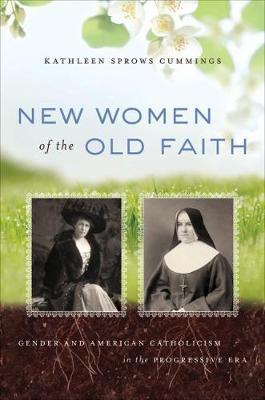Overview
American Catholic women rarely surface as protagonists in histories of the United States. Offering a new perspective, Kathleen Sprows Cummings places Catholic women at the forefront of two defining developments of the Progressive Era: the emergence of the 'New Woman' and Catholics' struggle to define their place in American culture.Cummings highlights four women: Chicago-based journalist Margaret Buchanan Sullivan; Sister Julia McGroarty, SND, founder of Trinity College in Washington, D.C., one of the first Catholic women's colleges; Philadelphia educator Sister Assisium McEvoy, SSJ; and Katherine Eleanor Conway, a Boston editor, public figure, and anti suffragist. Cummings uses each woman's story to explore how debates over Catholic identity were intertwined with the renegotiation of American gender roles. By examining female power within Catholic religious communities and organizations, she challenges the widespread assumption that women who were faithful members of a patriarchal church were incapable of path breaking work on behalf of women.Cummings emphasizes, though, that her subjects understood themselves to be far more marginalized as Catholics than they were as women. Her analysis makes a strong argument for the need to devote more attention to religious identity as a factor in interpreting women's lives.
Full Product Details
Author: Kathleen Sprows Cummings
Publisher: The University of North Carolina Press
Imprint: The University of North Carolina Press
Edition: New edition
Dimensions:
Width: 15.60cm
, Height: 2.80cm
, Length: 23.50cm
Weight: 0.558kg
ISBN: 9780807832493
ISBN 10: 0807832499
Pages: 296
Publication Date: 15 February 2009
Audience:
General/trade
,
General
Format: Hardback
Publisher's Status: Out of Print
Availability: In Print

Limited stock is available. It will be ordered for you and shipped pending supplier's limited stock.
Reviews
[A] beautifully written book. . . . Demonstrates that it is time for the story of religious minorities to be more deeply integrated into 'mainstream' American history. <br>- American Historical Review
An important contribution. . . . Cummings's strategy of explicating the dual identity of American Catholic women through the lives of four 'exceptional' women works exceedingly well. She expertly weaves between biography and social history, expanding her analysis outward onto broad issues. . . . With subtlety, insight, and detailed research, Cummings elucidates religion and gender in the Progressive Era by considering American Catholic women as important historical agents. <br>- Journal of Religion
An important contribution. . . . With subtlety, insight, and detailed research, Cummings elucidates religion and gender in the Progressive Era by considering American Catholic women as important historical agents.--Journal of Religion Clear prose and sophisticated analysis. . . . Cummings' careful analysis encourages historians of women to consider the limits of the Second-Wave narrative.--Reviews in American History Fascinating. . . . Will assuredly appeal to anyone interested in the story of American Catholicism and the growth of the American immigrant church. . . . A fresh perspective on the struggles [of] Catholic women.--America An enjoyable read. . . . Cummings has exhausted scores of manuscript collections, newspapers, and secondary sources to construct a lively narrative that enhances our understanding of American women during the Progressive Era.--Journal of American History An important contribution. . . . Cummings's strategy of explicating the dual identity of American Catholic women through the lives of four 'exceptional' women works exceedingly well. She expertly weaves between biography and social history, expanding her analysis outward onto broad issues. . . . With subtlety, insight, and detailed research, Cummings elucidates religion and gender in the Progressive Era by considering American Catholic women as important historical agents.--Journal of Religion A timely, enlightening book--required reading for those who wish to understand the religious landscape of the Progressive Era and the historical background of today's culture wars. Highly recommended.--Choice Elegantly written. . . . This volume takes us to places we have never been before.--American Catholic Studies Exquisitely written. . . .A ground-breaking contribution to gender studies. . . . Will capture the interest of both armchair and professional historians.--Annals of Iowa Richly diversified primary research conducted in numerous archives, buttressed by a wealth of secondary literature. . . . Cummings's insightful assessment of the religious vision and personal goals of women standing on shifting Catholic ground proves one of the major strengths of her book. . . . There is much here for those interested in America's heartland. . . . A readable and original contribution to the literature of Catholic womanhood, professed and secular. . . . Highly recommended to scholars of gender and religion.--Indiana Magazine of History This well-written and finely nuanced book makes an important contribution to scholarship in Catholic history and American women's history.--The Catholic Historical Review Makes a major contribution to women's history by taking seriously religion as a category of analysis for understanding Progressive Era reform impulses. . . . More than a study of Catholic reformers, this book helps us understand why many religious women rejected feminism and yet acted as feminists.--Church History
An important contribution. . . . Cummings's strategy of explicating the dual identity of American Catholic women through the lives of four 'exceptional' women works exceedingly well. She expertly weaves between biography and social history, expanding her
[Cummings] clearly demonstrates the centrality of Catholic women in the period's social transformations. <br> -The Journal of the Gilded Age and Progressive Era
An important contribution. . . . With subtlety, insight, and detailed research, Cummings elucidates religion and gender in the Progressive Era by considering American Catholic women as important historical agents.--Journal of Religion <p/>
Author Information
KATHLEEN SPROWS CUMMINGS is assistant professor of American studies and associate director of the Cushwa Center for the Study of American Catholicism at the University of Notre Dame.



